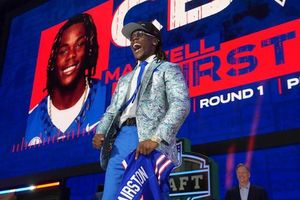The Philadelphia Eagles have found themselves at the center of speculation following their impressive victory against the Kansas City Chiefs, claiming the title of Super Bowl champs for the second time. Yet, recent buzz about the team declining to visit the White House has proved to be unfounded.
It all started when news outlets, including The U.S. Sun, reported claims of the Eagles turning down President Donald Trump’s invitation to the White House. The reports ignited widespread discussions across social media, with different analysts taking sides. Conservative commentator Megyn Kelly expressed her disdain, urging the Eagles to rethink their choices, tweeting, "Go F Yourselves Eagles" to her millions of followers. Conversely, former CNN personality John Harwood praised the alleged refusal, stating, "Because the Eagles have self-respect.”
Despite the swirling rumors, it turns out the situation is not as it seems. According to multiple sources, including those close to the NFL, there has been no official White House invitation extended to the Eagles yet, which means they have not officially declined anything. A White House representative confirmed the reports of the Eagles' supposed refusal as false, indicating, "The Eagles have not rejected a White House invite. The reports circulating are fake news." This directly contradicts earlier claims about the Eagles opting out of the traditional championship visit.
Historically, the Eagles' relationship with the White House has been complex. After winning Super Bowl LII back in 2018, the team faced difficulties due to political tensions. Trump canceled the event at the last minute, citing players' protest actions during the national anthem as the reason for not attending. This incident marked the beginning of their tumultuous relationship, as many Eagles players intended to boycott the event due to their opposition to Trump's presidency.
With the recent victory secured on February 9, 2025, the Eagles are once again poised to interact with the White House but under different circumstances. The Eagles are currently engaged in internal discussions about how to respond should an invitation be extended. Notably, owner Jeffrey Lurie has remained non-committal, reflecting the ambivalence surrounding the upcoming decision.
While there are no immediate plans for the team to visit the White House, it does not discount the team's potential acceptance of an invitation when it arrives. Backroom talks imply the Eagles might be open to attending, contradicting the earlier narrative of refusal. “There’s been no rejection,” stated one insider involved with the discussions. The environmental dynamics surrounding the team this time may have changed, as the NFL seems to be cautious not to provoke the political climate, especially considering the significance of Trump’s historical involvement with the league during his presidency.
Much of the current discourse reveals the intense scrutiny professional athletes face when intersecting with political realms. The Eagles are not alone; many teams have found themselves walking this precarious line of public perception and personal beliefs when considering such visits. The Southern California GOP's political action committee even noted the lasting effects of the earlier Eagles’ White House debacles, labeling them as politically motivated due to the players' stance against some of Trump's controversial positions.
Nevertheless, as the Eagles continue to bask in the glory of their recent triumph, the question of whether they will make the trip to Washington remains unanswered. With NFL activities on pause until the mini-camp phase starts later this year, there is no urgency for the Eagles to make any broadcast decisions just yet.
The cultural influence of sport intermingled with political factors escalates when the Eagles, as champions, are expected to adhere to the historical norm of commemorative visits to the White House. Whether these kinds of festivities will continue under the Trump administration is still intertwined with how players view their responsibilities as public figures and their individual beliefs. The upcoming decision may set a larger precedent for how professional sports teams engage with political platforms, especially under the gaze of the always-watching media.
While dialogue continues to swirl around the conflicting narratives concerning the Eagles and the White House, one thing is clear: until there is official word of both the invitation and the Eagles’ response, the speculation is tantamount. Given the complex web of opinions, traditions, and political stances, finding common ground remains challenging for the NFL and its athletes.
“This might be another lie brought about by speculation,” stated one prominent analyst, referencing Mark Twain's famous quote about how untruths can spread before the truth even has the chance to emerge. The Eagles' performance and next steps will be closely monitored, as sports, culture, and politics collide once more, leaving fans and political analysts eagerly awaiting the final verdict on any potential celebration.



